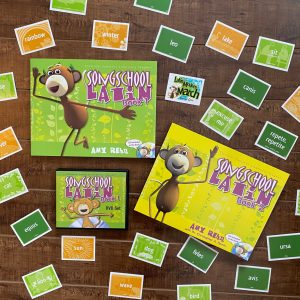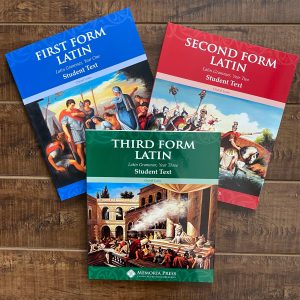Your bag is empty
Don't miss out on great deals! Start shopping or Sign in to view products added.
Shop What's New Sign in
Once upon a time, long ago, I wanted to learn Latin. I was not necessarily convinced by all the discussions and articles that went on at length about the benefits of Latin. I was a teenager, and Latin was “dead” they said. So I wanted to know more.
After trying out a few courses, including Wheelocks Latin, I gave up. I did not understand why the endings of the words kept changing. I did not get how they did that thing with action verbs and being verbs. And let us not even start talking about prepositions. Back then Latin tutors weren’t even thinking about tutoring yet. Self-included.
Fast forward a few years, and a couple of babies. Of course, you must decide on which curriculum to use before your child turns 2, so I was on it. I was reviewing and reading up on anything and everything that might prepare me and my children for their education. This time around, there was more discussion around the learning of Latin. I had given up hope for myself, but I was convinced that Latin was necessary for a well-rounded education for the sake of my children. But this time I decided to go a different route. Rather than learning Latin from a vocabulary emphasis, I decided to learn it from a grammar emphasis.
What is the difference? Well, with a vocabulary emphasis the goal is to have the student reading and speaking Latin as soon as possible. The more you read, the more you understand which endings go along with each other, and the more words you memorize the broader your vocabulary so you can start to understand what you are reading.
With a grammar emphasis, the rules of Latin are taught, alongside vocabulary to be sure. But there are a few key reasons why one might want to learn Latin from a grammatical perspective if one is already fluent in English.
There are great minds who have written extensively on the benefits of Latin. I would encourage you to read a few of their thoughts. And if in doubt, just jump into teaching Latin in faith. The riches are there, and some of them cannot be explained; you have to experience them. Here is the plan that I have pursued.

After I’ve said all that, I’ll be honest and admit that yes, this is a vocabulary program and it’s an excellent way to start with a young child. It introduces them to the language and gives them a few words to use around the house. This is especially fun if you have older kids learning Latin. Anything that makes the younger ones feel a part of the family is a winner. The DVD is the best part of this course. If you have a child who loves workbooks, add that in. But if your child isn’t into that, then just do the DVD.

Add ons:
Ludere Latin
Latin Review Worksheets (year 2)
Ecce Caecilia Et Verus (Latin Reader).
Note: if you are someone who really needs to learn from a vocabulary perspective, then you would love Song School Latin, Book 2 followed by Latin for Children, Primer A instead of the above.
First Form Latin, Second Form Latin, Third Form Latin

Add ons:
Ecce Caecilia Et Verus (Latin Readers)
Lingua Angelica
Acts of the Apostles: A Latin Reader
Lingua Latina Series
Note: if you are someone who really needs to learn from a vocabulary perspective, then you would love Latin for Children, Primer A, Primer B, and Primer C instead of the above.
Fourth Form Latin and Henle Latin

Note: If you really need to learn from a vocabulary perspective, you would love the Latin Alive Program instead of the above.
by Hester VanBraeden
Hester is a second-generation home-educating parent who is keenly aware that her own education is not complete, and comfortable that it probably never will be. She has many years of experience with children, books, and curriculum and loves to travel to worlds and times beyond the present with her four children through stories.